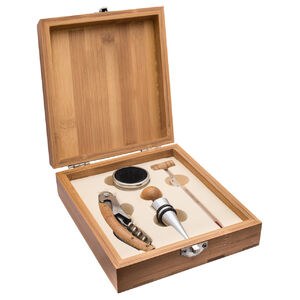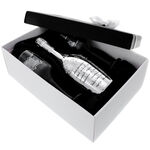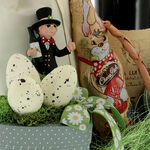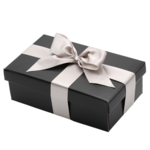
For a true wine lover, the experience extends beyond just tasting and savoring them; it involves the entire ritual of serving, storing, and even preserving them. The right accessories can transform this passion into a memorable and refined experience.
From essential tasting tools to items for opening and serving wines, and to accessories for proper storage, each element contributes to enhancing the pleasure of wine tasting.
Essential Wine Tasting Tools
Wine tasting is more than just the act of tasting a fermented liquid. It is a complex process that involves all the senses and requires essential tools to extract all the nuances and subtleties of the wine. Here are some of these indispensable tools:
Tasting glasses: Not all glasses are created equal when it comes to wine tasting. Tasting glasses are designed to concentrate the aromas and allow the wine to breathe properly. The shape of the glass allows the aromas to concentrate at the top, and the narrower opening helps channel the aromas towards the nose. Choosing a set of quality tasting glasses can make a significant difference in the wine tasting experience.
Decanter: A decanter is essential for older wines or those that require aeration before serving. Decanting allows the separation of sediments and the oxygenation of the wine, which helps highlight its aroma and taste. There are different shapes and sizes of decanters, and the right choice depends on the type of wine and the degree of aeration it requires.
Wine thermometer: The serving temperature of wine plays an essential role in expressing its characteristics. A specialized wine thermometer can help monitor and maintain the correct temperature for each type of wine. For example, red wines are usually served at a higher temperature than whites or sparkling wines, and a wine thermometer can ensure that each bottle is served at the optimal temperature.
Bottle openers: Opening a bottle of wine can be a delicate operation, and the right tools can make the process easier and safer. Bottle openers are designed to provide a firm grip on the bottle neck and ensure smooth cork extraction without breaking or crumbling it.
These are just a few of the essential tools for wine tasting, and each of them contributes to a richer and more informative experience in exploring the wonderful world of wines.
Articles for Opening and Serving Wines
Opening and serving wines are crucial steps in the serving experience, and choosing the right items can make the difference between a successful and unsuccessful service. Here are some essential items for these stages:
Corkscrew: This is the first tool we use to open a bottle of wine. A quality corkscrew is sturdy and provides a firm grip on the cork, making it easier to extract it without damaging the bottle's wrapper or the cork.
Cutter: Some wine bottles are covered with a lead or plastic capsule that needs to be removed before opening. A specialized cutter for capsules facilitates this process, ensuring a clean and even cut.
Wine aerator: For young wines or those with robust flavors, a wine aerator can help accelerate the aeration process and quickly reveal the aromas. There are different types of aerators, including models that attach directly to the bottle neck or decanters with integrated aeration systems.
Decanter: An elegant decanter can be used for serving wines, especially older ones or those that require decanting. A decanter allows the wine to breathe and reveal all its nuances and subtleties before being served.
Vacuum pump: After a wine bottle is opened, it's important to keep it fresh for as long as possible. A vacuum pump can be used to extract air from the bottle and prevent wine oxidation, keeping it fresh for several days after opening.
Drip ring: A drip ring placed around the bottle neck can help prevent spills and maintain a clean table during wine service.
These are just a few of the essential items for opening and serving wines. A proper selection of such items can contribute to a more enjoyable and refined serving experience.
Elements for Elegant Presentation and Service of Wines
When it comes to presenting and serving wines in an elegant and sophisticated manner, every detail matters. Here are some essential elements to create a stylish and refined atmosphere:
Wine glass sets: Select a set of wine glasses that match the type of wine you want to serve. Tall-stemmed tulip glasses are ideal for red wines, while those with a narrower opening and smaller bowl are suitable for white and sparkling wines.
Elegant decanter: An elegant decanter can add an extra touch of sophistication to wine presentation, especially for older wines or those that require decanting to aerate properly. Choose a decanter with an attractive design and a shape that allows the wine to aerate properly.
Matching utensils and plates: Make sure you have matching utensils and plates suitable for serving wines. Snack plates or platters with cheeses and fruits can complement the wine tasting experience.
Wine bottle handles: Wine bottle handles are elegant and practical accessories that allow wine to be served without touching the bottle neck. This can add a touch of refinement and avoid fingerprints on the bottle.
Wine bottle holders: Wine bottle holders can be used to display and serve wines in an organized and aesthetically pleasing manner. Choose a holder with a design that matches your decor and allows bottles to be displayed attractively.
Decorative elements: Add some decorative elements around the wine serving area to create an atmosphere full of elegance and style. Candles, floral arrangements, or elegant tablecloths can complement the look and highlight the wine presentation.
These elements of elegant wine presentation and service contribute to creating a sophisticated and memorable tasting experience for you and your guests.
Tips for Preserving and Maintaining the Freshness of Opened Wines
To preserve and maintain the freshness of opened wines, it's important to follow a few recommended tips and practices:
Store the bottle upright: After opening, it's recommended to store the wine bottle upright. This helps minimize the wine's contact with the cork, which can absorb odors and alter the wine's taste.
Use a stopper or cap: After opening, replace the original cork with a stopper or cap specially designed for wine preservation. These create a better seal and reduce the wine's exposure to air, preventing oxidation and maintaining freshness.
Store the wine at the right temperature: Storage temperature is essential for maintaining the freshness of opened wine. Avoid exposure to extreme temperatures and store the bottle in a cool, dark place, ideally between 12 and 18 degrees Celsius.
Avoid exposure to light and heat: Light and heat can accelerate wine oxidation and affect its quality. Store the bottle in a dark place away from sources of heat or excessive light, such as direct sunlight or bright lights.
Use a vacuum storage system: A vacuum storage system can be useful for extracting air from inside the bottle and creating an inert environment that prevents wine oxidation. Pump the air out of the bottle and seal it with a special stopper to maintain the wine's freshness for longer.
Consume within a reasonable time frame: Even with all precautions taken, opened wine will begin to lose its freshness over time. Try to consume the wine within a reasonable time frame after opening, usually within a few days or a week for younger wines and shorter for older ones.
Follow these simple tips to ensure that opened wine remains fresh and delicious for as long as possible.
Accessories for Cleaning and Maintaining Glassware and Decanters
Regular cleaning and maintenance of glassware and decanters are crucial to keeping them in pristine condition and ensuring a pleasant and worry-free wine serving experience. Here are some essential accessories for these purposes:
Glass cleaning brush: A special brush for cleaning glassware is indispensable for reaching difficult areas and removing wine residues and stains from the inner walls of the glasses. Make sure the brush is made of non-abrasive materials to prevent scratching the glass.
Decanter cleaning brush: For decanter cleaning, a long, thin brush is essential for reaching the bottom of the decanter and removing sediment and wine residues. Look for models that are flexible and adaptable to the decanter's shape for efficient cleaning.
Glass and decanter detergent: Use a specialized detergent designed for cleaning wine glasses and decanters that is non-abrasive and leaves no traces or residues after rinsing. Some glass detergents contain enzymes that help dissolve wine residues and grease.
Glass cleaning beads: Cleaning beads are small but effective accessories that can be inserted into glasses along with water and detergent to remove dirt and residues from hard-to-reach corners. These are particularly useful for cleaning glasses with narrow necks or complex shapes.
Drying racks: After cleaning, use a rack or special stand for drying glasses and decanters. This allows air to circulate around the glasses and prevents water stains or mold formation. Make sure the stand is stable enough to prevent accidental tipping of the glasses.
Microfiber cleaning cloths: Microfiber cleaning cloths are ideal for polishing and wiping glasses after drying. They quickly absorb moisture and leave no streaks or lint, ensuring that the glasses are shiny and spotless.
These cleaning and maintenance accessories are essential for keeping glassware and decanters in pristine condition and ensuring a pleasant and hassle-free wine serving experience.
In conclusion, wine accessories are not just simple objects; they are true tools that contribute to enriching and refining the wine serving experience. From opening the bottle to serving it in the most elegant and suitable containers, and from preserving its freshness to cleaning and maintaining the glasses and decanters, each accessory has its essential role.
Investing in such accessories is not only an expression of passion for wines but also a way to intensify and deepen the pleasure and knowledge of this fascinating world of wines.



